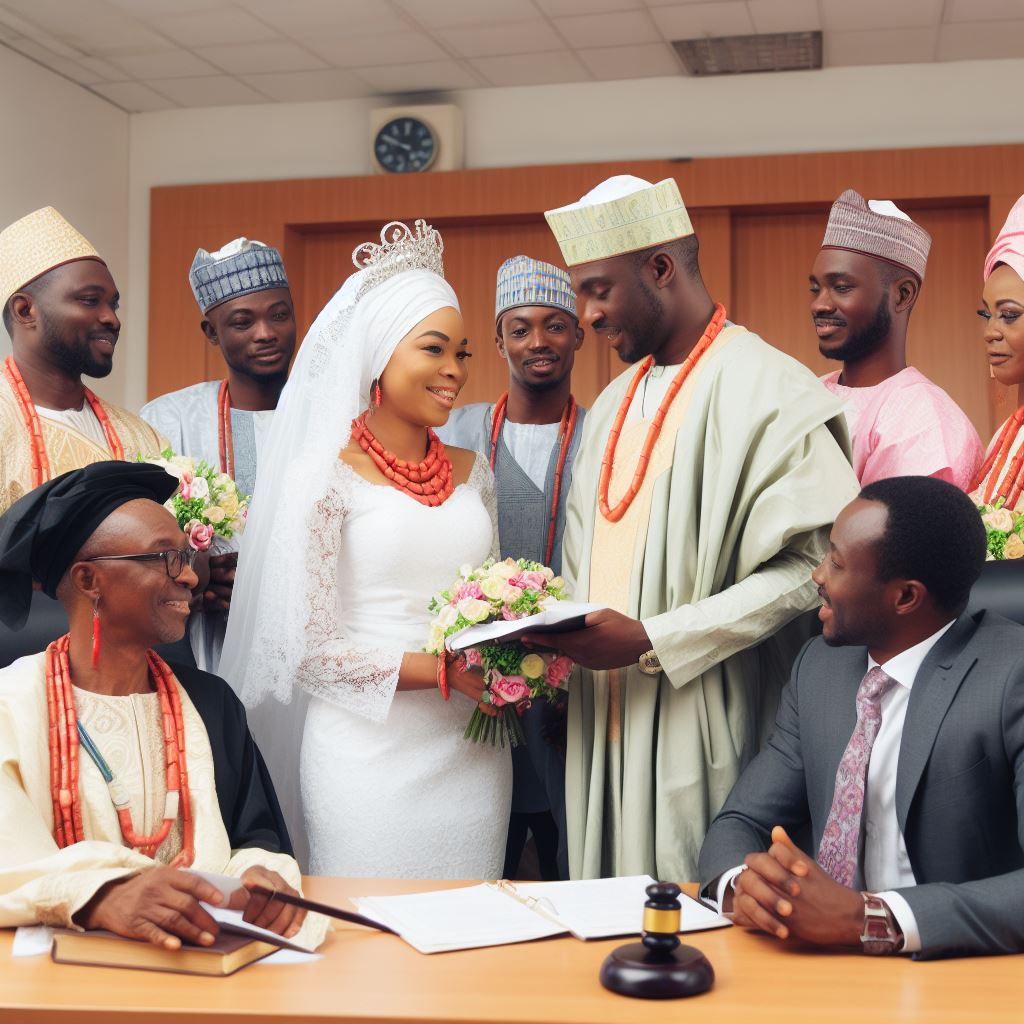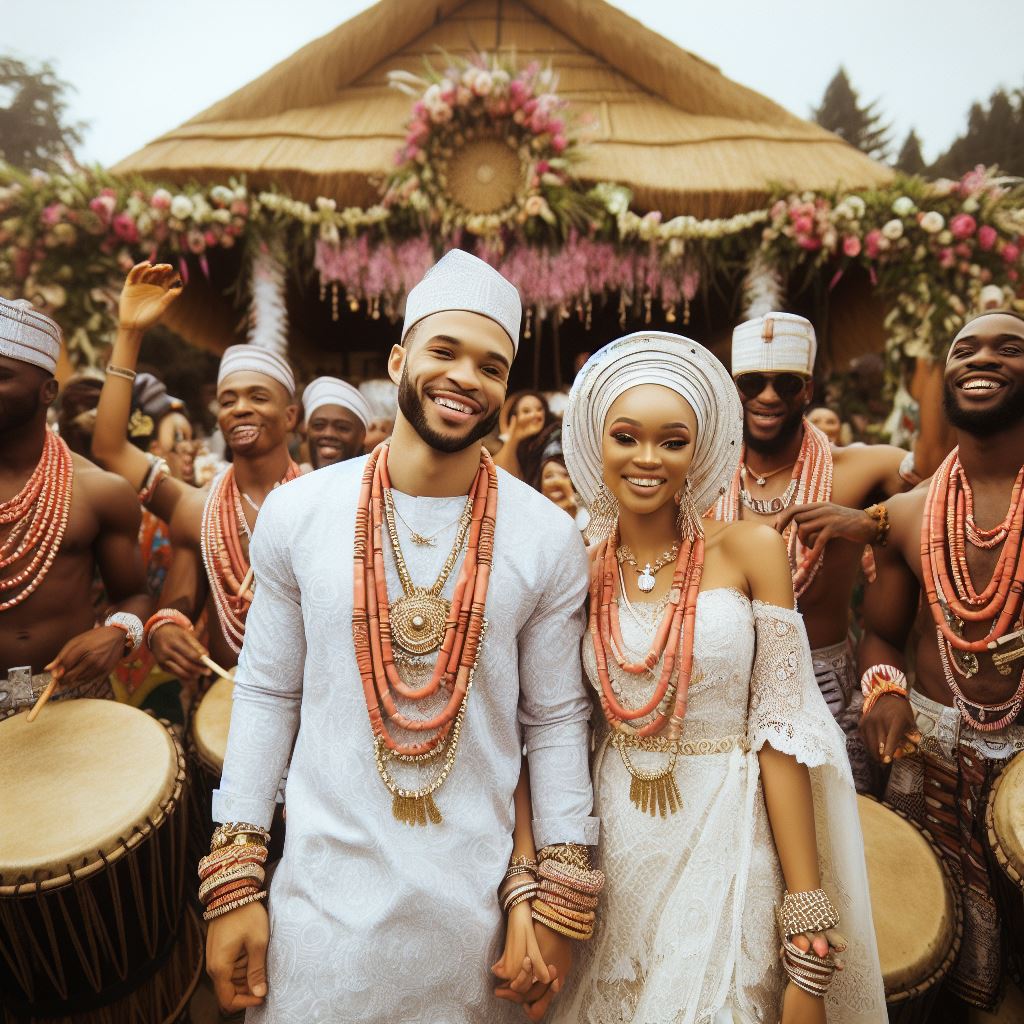Introduction
Legal Requirements for Marriages in Nigerian Law play a pivotal role in upholding the legitimacy and safeguarding of marital relationships.
Nigerian law holds significant importance in governing marriages within the country.
Brief Overview of the Importance of Legal Requirements for Valid Marriages
The legal requirements for valid marriages serve as safeguards to ensure that unions are entered into willingly, legally, and with proper consent.
They provide a framework for the rights and responsibilities of married individuals, especially with regards to property ownership, inheritance, and child custody.
Significance of Nigerian Law in Governing Marriages
Nigerian law plays a vital role in regulating marriages within the country.
It sets out the necessary conditions and procedures for formalizing a marriage, including age requirements, consent, and the presence of witnesses.
Compliance with these legal requirements ensures that marriages are recognized and protected by the state, promoting stability and certainty in relationships.
Additionally, Nigerian law provides guidance on issues such as polygamy, divorce, and marriage dissolution, ensuring fair and just outcomes for all parties involved.
It also prohibits forced marriages, child marriages, and marriages based on fraudulent or deceptive practices.
By upholding these legal requirements, Nigerian law strives to prevent exploitation, discrimination, and abuse within marital relationships.
It aims to promote fairness, protect the rights of individuals, and provide a solid legal foundation for the institution of marriage in Nigeria.
Basically, legal requirements for valid marriages in Nigeria are essential for ensuring the legitimacy, protection, and stability of marital relationships.
Nigerian law plays a significant role in governing marriages by setting out the necessary conditions, procedures, and safeguards for marriage formation and dissolution.
Compliance with these legal requirements promotes fairness, equality, and the overall well-being of married individuals.
Definition of Marriage under Nigerian Law
In order to fully comprehend the legal requirements for valid marriages under Nigerian law, it is essential to understand the definition of marriage as recognized by the country’s legal system.
Explanation of the definition of marriage in Nigerian law
The definition of marriage under Nigerian law is a union between a man and a woman who voluntarily choose to enter into a lifelong commitment.
This definition is based on cultural, religious, and social values prevalent in Nigeria.
Types of marriages recognized by Nigerian law
Nigerian law recognizes three types of marriages:
- Customary marriages: These are marriages celebrated according to the customs and traditions of the ethnic group or indigenous community of the parties involved. They are recognized as valid as long as they comply with the customs and traditions.
- Statutory marriages: Also known as civil marriages, these are formal unions conducted in accordance with the Marriage Act of Nigeria. They require registration with the appropriate authorities and the issuance of a marriage certificate.
- Islamic marriages: These marriages are conducted in accordance with Islamic law and are recognized by Nigerian law as long as they comply with certain requirements such as consent, witnesses, and registration.
Importance of a valid marriage under Nigerian law
A valid marriage under Nigerian law is of significant importance for several reasons:
- Legal rights and responsibilities: A valid marriage confers legal rights and responsibilities on the spouses, including rights to property, inheritance, and the responsibility to support each other.
- Parental rights and responsibilities: A valid marriage provides a legal framework for parents to exercise their rights and responsibilities towards their children, including custody, visitation, and child support.
- Social recognition and acceptance: A valid marriage is socially recognized and accepted, providing stability and legitimacy to the relationship in the eyes of the community.
- Protection against invalid marriages: A valid marriage safeguards parties from being involved in fraudulent or invalid unions that may lead to legal complications and disputes.
Generally, understanding the legal requirements for valid marriages under Nigerian law involves grasping the definition of marriage, identifying the different types of marriages recognized, and recognizing the importance of a valid marriage.
Compliance with these requirements ensures the legal rights and protections available to married individuals in Nigeria.
Read: Marriage Act in Nigeria: Implications for Interfaith Couples
Age Requirement for Marriage in Nigeria
Minimum age for marriage under Nigerian law
- The minimum age for marriage in Nigeria is 18 years for both males and females.
- This age requirement is stipulated by the Child Rights Act of 2003.
Exceptions to the minimum age requirement
- In some parts of Nigeria, customary law allows for marriage below the age of 18.
- The Nigerian Constitution recognizes the right of individuals to freely practice their religion.
- Islamic law, for instance, permits girls to get married once they attain puberty.
- However, these exceptions are subject to debates as they may conflict with child protection laws.
Consequences of marrying underage.
- Marrying underage can lead to a variety of negative consequences, both for the individuals involved and society as a whole.
- It deprives children of their right to education, as they are forced into adult responsibilities prematurely.
- Early marriages often result in a higher risk of complications during pregnancy and childbirth for underage girls.
- The emotional and psychological well-being of underage spouses may be compromised due to the lack of maturity and life experience.
- There is a greater likelihood of poverty and economic hardship for couples who marry at a young age.
- Underage marriages also perpetuate gender inequality, as young girls often face limited opportunities and are more vulnerable to abuse.
- The cycle of poverty can continue through generations if early marriages are not addressed.
Essentially, the legal age requirement for marriage in Nigeria is 18 years of age, as set by the Child Rights Act of 2003.
However, there are exceptions based on customary and religious practices.
Marrying underage can have severe consequences such as the denial of education and increased health risks for young girls.
It is essential to address these issues to protect the rights and well-being of Nigerian children.
Read: How the Marriage Act in Nigeria Affects Property Rights
Consent for Marriage
Free and Genuine Consent
In Nigerian law, marriage hinges on free and genuine consent, an imperative requirement for a valid union.
The law mandates that both parties willingly agree to the matrimony, fully comprehending its implications.
The key points to note are:
- Voluntary Agreement: Spouses must willingly enter into the marriage contract without any external pressure or coercion. This ensures that the decision to marry is a personal one.
- Understanding Implications: It’s essential that both parties understand the legal and social implications of marriage, including their responsibilities and rights.
- Mental Capacity: Each party must possess the mental capacity to make such a decision. The law safeguards against individuals who might not fully comprehend the decision due to a lack of mental capacity.
Consequences of Forced or Coerced Marriages
Forced or coerced marriages are not only morally wrong but also legally invalid in Nigeria. The consequences of such marriages are severe:
- Null and Void: Any marriage entered into under duress, threat, or deceit is considered null and void by Nigerian law.
- Legal Consequences: Legal actions may be taken against individuals responsible for coercing or forcing someone into marriage, including criminal charges.
- Protection of Rights: The law ensures that individuals can seek legal protection and dissolution of a forced marriage, preserving their rights and dignity.
Importance of Consent in Validity
The cornerstone of a valid marriage in Nigeria is consent. It holds immense importance for several reasons:
- Human Rights: It upholds the fundamental human rights of individuals to make choices about their life, including marriage.
- Stable Unions: Genuine consent leads to stable and harmonious unions, reducing the likelihood of divorce or domestic disputes.
- Legal Protection: It protects individuals from the potential abuses and violations that can occur in forced marriages.
In general, consent is the bedrock of valid marriages under Nigerian law.
It ensures that the institution of marriage is based on the free will and understanding of both parties, creating a foundation for enduring and lawful unions.
Read: Understanding Nigeria’s Marriage Act: A Comprehensive Guide

Capacity and Mental Health
Requirement of Mental Capacity to Enter into Marriage
- According to Nigerian law, mental capacity is a crucial requirement for entering into marriage.
- Both parties must have the mental ability to understand the nature and consequences of marriage.
- They should be capable of giving voluntary consent to the marriage contract.
Consequences of Lacking Mental Capacity
- If one or both parties lack mental capacity, the marriage may be considered void or voidable.
- Void marriages are considered invalid from the beginning, while voidable marriages may be annulled by the court.
- Lack of mental capacity can arise due to mental illness, intellectual disability, or intoxication.
Importance of Mental Health in Marriage
- Mental health plays a vital role in ensuring a stable and harmonious marital relationship.
- A sound mental state allows individuals to make informed decisions and participate fully in the marriage.
- Mental health issues can lead to difficulties in communication, emotional instability, and conflicts within the marriage.
Emotional Well-being
- Mental health contributes to emotional well-being, enabling partners to nurture a loving and supportive relationship.
- Emotional stability allows couples to handle the ups and downs of married life effectively.
Decision-Making and Consent
- Mental health ensures the ability to make rational decisions and provide genuine consent to the marriage.
- Parties with impaired mental capacity may not fully comprehend the rights, duties, and obligations associated with marriage.
Communication and Conflict Resolution
- Good mental health facilitates effective communication, leading to better understanding and conflict resolution.
- Mental health issues, such as anxiety or depression, can hinder effective communication and exacerbate conflicts.
Parental Responsibilities
- Sound mental health is essential for fulfilling parental responsibilities towards children within the marriage.
- It enables parents to provide a stable and nurturing environment conducive to the child’s well-being and development.
In essence, mental capacity is a fundamental requirement for a valid marriage under Nigerian law.
Parties must have the ability to understand the implications of marriage and provide voluntary consent.
Lack of mental capacity can render a marriage void or voidable, and mental health plays a crucial role in maintaining a healthy and fulfilling marital relationship.
Considering the importance of mental health, couples should prioritize their emotional well-being and seek support when needed to ensure a happy and stable marriage.
Read: The Role of Faith in Upholding a Sanctified Marital Relationship
Prohibition of Polygamy
Polygamy, defined as the practice of having multiple spouses simultaneously, is strictly prohibited under Nigerian law.
The Marriage Act of Nigeria recognizes monogamy as the only valid form of marriage.
This means that a person can only be lawfully married to one spouse at a time.
Legal restrictions on polygamy in Nigeria
The legal restrictions on polygamy are clear and unambiguous.
Both parties must provide consent for a valid marriage.
An existing spouse’s consent is necessary before subsequent marriages, safeguarding rights and transparency.
Consequences of engaging in illegal polygamous marriages
Engaging in illegal polygamous marriages carries severe consequences under Nigerian law.
It is considered a criminal offense and individuals found guilty can face imprisonment and/or payment of fines.
Moreover, such marriages are also deemed void, meaning they have no legal recognition or protection.
Parties involved in illegal polygamous marriages may find themselves without the rights, privileges, and responsibilities associated with a valid marriage.
Impact of polygamy on the validity of marriages
The impact of polygamy on the validity of marriages is significant.
If a marriage involves more than one spouse, it automatically becomes void.
Moreover, Nigerian law deems subsequent marriages invalid if a person doesn’t dissolve their prior valid marriage, thus not protecting them.
The consequences of engaging in illegal polygamous relationships extend beyond the individuals involved.
Children born from such unions may not enjoy legal benefits and succession rights.
People may question their status and legitimacy, potentially denying them crucial inheritance and social security entitlements.
In order to protect the sanctity of marriage and the rights of all parties involved, the Nigerian legal system takes a firm stance against polygamy.
The Marriage Act, with other laws, mandates consent, transparency, and monogamy in marriages.
By upholding these legal requirements, the Nigerian legal system seeks to promote stable and harmonious family structures within the country.
Prohibition of Incestuous Marriages
Incestuous marriages are one of the key areas where Nigerian law takes a firm stance due to cultural, moral, and ethical considerations.
Let’s delve deeper into the prohibition of incestuous marriages in Nigerian law and understand its implications.
Overview of the prohibition of incestuous marriages in Nigerian law
Nigerian law unequivocally prohibits marriages between close blood relatives.
The Nigerian Marriage Act, under Section [X], defines the list of prohibited degrees of affinity and consanguinity.
These include relationships such as parent-child, siblings, half-siblings, grandparents, grandchildren, and so on.
People believe incestuous marriages can lead to genetic abnormalities and harm offspring. Nigerian society deems such unions morally and culturally unacceptable.
Consequences of marrying a close blood relative
Marrying a close blood relative in Nigeria carries severe legal consequences.
Individuals who engage in an incestuous marriage can face criminal charges resulting in imprisonment or hefty fines.
The Nigerian court can annul such marriages, rendering associated rights and obligations, like property or inheritance, null and void.
In addition to the legal consequences, individuals who engage in incestuous marriages may face severe social stigma and exclusion from their communities due to the cultural and moral implications associated with this act.
Impact of incestuous marriages on the validity of marriages
Nigerian law invalidates incestuous marriages from the start; it never existed, and no circumstance recognizes its validity.
Consequently, parties to an incestuous marriage cannot seek legal remedies or protections typically afforded to married couples in Nigeria.
They cannot claim conjugal rights or rely on marital privileges such as spousal support or joint ownership of assets.
It is important to note that the prohibition on incestuous marriages extends not only to traditional marriages but also to civil and religious marriages solemnized in Nigeria.
The law treats all forms of marriages equally in terms of this prohibition.
In short, the prohibition of incestuous marriages in Nigerian law serves to protect the genetic well-being of future generations and upholds societal norms.
Individuals who knowingly marry close blood relatives not only face severe legal consequences but also have their marriages considered void from the very beginning.
It is crucial for individuals intending to enter into a marriage in Nigeria to understand and adhere to the laws and regulations surrounding the prohibition of incestuous marriages to avoid any legal and social repercussions.
Registration of Marriages
Requirement of registering marriages under Nigerian law
- Marriages conducted in Nigeria must be registered within a specified period.
- The registration requirement applies to both civil and customary marriages.
- Registration should be done at the appropriate marriage registry or office.
- Both parties must provide necessary documents, including proof of age, identity, and consent.
- The marriage registrar will issue a marriage certificate upon successful registration.
Consequences of failing to register a marriage
- Failing to register a marriage within the specified period may render the marriage void.
- Unregistered marriages may not be legally recognized, affecting various rights and benefits.
- Parties to an unregistered marriage may face challenges in obtaining legal recognition for their relationship.
- In case of dissolution, unregistered marriages may not receive legal protection for property division and support.
Importance of proper registration for the validity of marriages
- Proper registration ensures legal recognition and validity of the marriage.
- Registered marriages provide clarity and certainty regarding the rights and obligations of both parties.
- Registration enables access to various legal benefits and protections, such as inheritance and spousal support.
- It allows for the creation of an official record, which serves as proof of the existence of the marriage.
- Registration also facilitates the resolution of disputes and proof of marriage in legal proceedings.
You Might Also Like: Registry Wedding Outfit Ideas Suitable for Nigerian Climate
Conclusion
A valid marriage under Nigerian law requires adherence to key legal requirements. These include:
- Legal age of marriage: Both parties must be at least 18 years old.
- Consent: Consent of parties entering the marriage must be voluntary and without coercion.
- Customary law: Traditional marriages must comply with customary law practices and ceremonies.
- Registry marriage: Civil marriages must be registered at a recognized marriage registry.
- Void marriages: Marriages prohibited by law, such as those involving close relatives, are considered void.
By adhering to these requirements, individuals ensure their marriages are legally valid and recognized in Nigeria.
The significance of adhering to these legal requirements cannot be overstated.
A valid and recognized marriage in Nigeria provides several benefits and protections, including:
- Legal status: A valid marriage confers legal rights and responsibilities to both parties.
- Property rights: Spouses have ownership rights and may inherit property from each other.
- Parental rights: In a valid marriage, both parents have equal rights and responsibilities towards their children.
- Divorce proceedings: Only valid marriages are entitled to legal divorce proceedings and related benefits.
- Recognition: A valid marriage is recognized by society and provides social validation and acceptance.
It is crucial for individuals planning to marry in Nigeria to understand and comply with the legal requirements.
This ensures the validity and recognition of their marriage, safeguarding their rights and providing them with the necessary legal protections.




